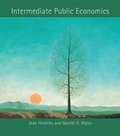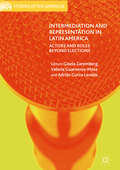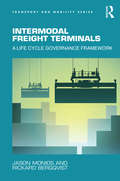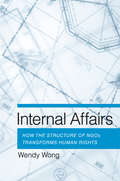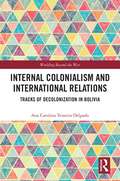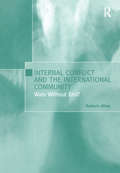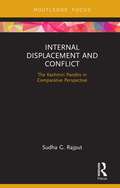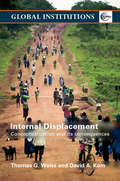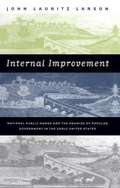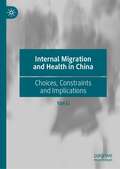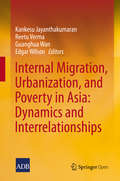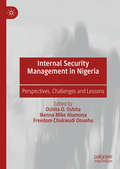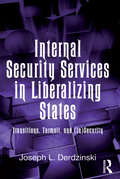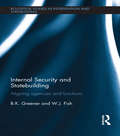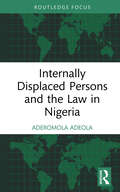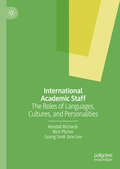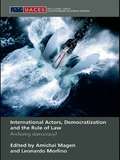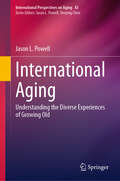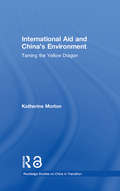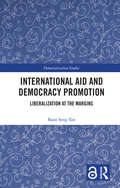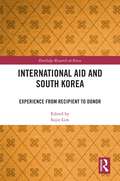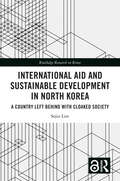- Table View
- List View
Intermediate Public Economics
by Jean Hindriks Gareth D. MylesPublic economics studies how government taxing and spending activities affect the economy--economic efficiency and the distribution of income and wealth. This comprehensive text in public economics covers the core topics market failure and taxation as well as recent developments in the political economy and public choice literatures. It is unique not only in its broad scope but in its balance between public finance and public choice and its combination of theory and relevant empirical evidence. After introducing the theory and methodology of public economics and reviewing the efficiency of the competitive equilibrium, the book presents a historical and theoretical overview of the public sector. It then discusses departures from efficiency, including imperfect competition and asymmetric information; issues in political economy, including rent-seeking (a topic often omitted from other texts); equity; taxation issues, including tax evasion and its consequences; fiscal federalism and tax competition among independent jurisdictions; and the intertemporal issues of social security and economic growth. This text introduces the reader to the theory of public economics and the most significant results of the analysis, providing an overview of the current state of the field. It is accessible to anyone with a background of intermediate microeconomics and macroeconomics and can be used in advanced undergraduate as well as graduate courses. Although the mathematics has been kept to a minimum, the book remains analytical rather than discursive. Annotated suggestions for further reading and numerous exercises are included at the end of each chapter.
Intermediation and Representation in Latin America
by Gisela Zaremberg Valeria Guarneros-Meza Adrián Gurza LavalleThis book shows how the introduction of intermediation is relevant in studying political and public policy processes, as they are increasingly accompanied by grey spaces in public and non-public arenas that cannot be categorized as purely representative or purely participative. Instead, 'hybrid' mechanisms are developing in the policy-making process, which bring in new actors who either are unelected while being required to represent or advocate for the common good of others or are directly elected but challenged by identity/rights-based issues of the people they are required to act in the best interest of. By proposing a conceptual frame on intermediation and addressing five different Latin American countries and a wide range of case studies --from human rights, labour relations, neighbourhood management, municipal bureaucracies, social accountability, to complex national systems of citizen participation--this volume shows the versatility and validity of a tridimensional frame, the "cube of political intermediation" (CPI) as a tool for analysing public policy and understanding contemporary democratic innovation in Latin America.
Intermodal Freight Terminals: A Life Cycle Governance Framework (Transport and Mobility)
by Jason Monios Rickard BergqvistMuch work has been done on port governance yet little has addressed intermodal terminal governance, despite the clear similarities. This book fills that gap by establishing a governance framework for situating analysis of intermodal terminals throughout their life cycle. A version of the product life cycle theory is amended with governance theory to produce a framework covering each stage of the terminal’s life cycle, from the initial planning to the many decisions taken regarding the public/private split in funding mechanisms, ownership, selecting an operator, specifying KPIs to the operator, setting fees, earning profit, ensuring fair access to all rail service operators, and finally to reconcessioning the terminal to a new operator, managing the handover and maintaining the terminal throughout its life cycle. An institutional analysis of stakeholder relations, situated within a governance framework, illuminates these issues and enables not only conceptualisation and greater understanding of the geography of intermodal transport, but also decision-making and goal-setting by planners and policy makers. This book thus has three functions: first, as a textbook on the planning and operation of intermodal terminals; second, as a presentation of recent empirical research on intermodal terminal governance; third, as a framework for future research in which the broad field of analysis of intermodal transport can be viewed through a single lens and used to inform geographers, policymakers and planners.
Intern Nation
by Ross PerlinMillions of young people--and increasingly some not-so-young people--now work as interns. They famously shuttle coffee in a thousand magazine offices, legislative backrooms, and Hollywood studios, but they also deliver aid in Afghanistan, map the human genome, and pick up garbage. Intern Nation is the first exposé of the exploitative world of internships. In this witty, astonishing, and serious investigative work, Ross Perlin profiles fellow interns, talks to academics and professionals about what unleashed this phenomenon, and explains why the intern boom is perverting workplace practices around the world.The hardcover publication of this book precipitated a torrent of media coverage in the US and UK, and Perlin has added an entirely new afterword describing the growing focus on this woefully underreported story. Insightful and humorous, Intern Nation will transform the way we think about the culture of work.
Internal Affairs: How the Structure of NGOs Transforms Human Rights
by Wendy H. WongWhy are some international nongovernmental organizations (NGOs) more politically salient than others, and why are some NGOs better able to influence the norms of human rights? Internal Affairs shows how the organizational structures of human rights NGOs and their campaigns determine their influence on policy. Drawing on data from seven major international organizations-the International Committee of the Red Cross, Amnesty International, Human Rights Watch, Médecins sans Frontières, Oxfam International, Anti-Slavery International, and the International League of Human Rights-Wendy H. Wong demonstrates that NGOs that choose to centralize agenda-setting and decentralize the implementation of that agenda are more successful in gaining traction in international politics.Challenging the conventional wisdom that the most successful NGOs are those that find the "right" cause or have the most resources, Wong shows that how NGOs make and implement decisions is critical to their effectiveness in influencing international norms about human rights. Building on the insights of network theory and organizational sociology, Wong traces how power works within NGOs and affects their external authority. The internal coherence of an organization, as reflected in its public statements and actions, goes a long way to assure its influence over the often tumultuous elements of the international human rights landscape.
Internal Colonialism and International Relations: Tracks of Decolonization in Bolivia (Worlding Beyond the West)
by Ana Carolina Teixeira DelgadoThis book investigates decolonization as a local process and its connections to international relations, introducing "internal colonialism" as a crucial analytical category for internationalists. Using Bolivia as a case study, the author argues that the reshaping of colonialism and its resistance domestically is also reflected and reproduced abroad by political actors, be they the governments or indigenous movements.By problematizing postcolonial debate concerning the constitution/reproduction of colonial logics in International Relations, the book proposes a return to the local to show how power relations are exercised concretely by the protagonists of political process. Such dynamics reveal the interrelationship between the local and the international, especially, in which the latter represents a necessary dimension to both reinforce colonialism and oppose colonial logics.Of interest to scholars and students of IR, Latin American and Andean Studies, this book will also appeal to those working in the fields of area studies, anthropology, indigenous politics, comparative politics, decolonization and political ecology.
Internal Conflict and the International Community: Wars Without End?
by Roderic AlleyThis insightful book debates whether conflict within states has emerged as the Achilles Heel of the international community. It covers a wide-range of issues including the roots of internal conflict, small arms supplies, intervention, human rights and international humanitarian law, refugees and post-conflict reconstruction. Internal Conflict and the International Community provides supplementary reading for third level undergraduates, post-graduates and scholars of international relations, comparative politics, development studies, international law and security and defence studies.
Internal Displacement and Conflict: The Kashmiri Pandits in Comparative Perspective
by Sudha RajputGrounded in multidisciplinary research, this book presents a methodical understanding of those displaced within their national borders, the Internally Displaced Persons (IDPs). The IDP phenomenon remains less understood than that of refugees due to the "internal" nature of the crisis, linked to a nation’s sovereignty, which assigns the responsibility for care to the national actors as opposed to an international body. However, the IDP phenomenon poses an international humanitarian challenge, with upwards of 40 million people currently in internal displacement across the globe. This book helps answer the most perplexing questions surrounding conflict-induced protracted displacements: namely, how do positions embraced by key actors inform/influence IDP policies, and why, despite the promise of robust return packages, do families remain reluctant to return to home communities and equally reluctant to embrace new host communities? Capitalizing on the diagnostic tool kit known as Dugan’s Nested Model, uniquely adapted to the Kashmiri Pandit displacement, this book also analyzes issues of the similarly displaced communities of Nagorno-Karabakh, Abkhazia and South Ossetia, Kosovo, and Darfur regions. This book will be of much interest to students of peace and conflict studies, humanitarianism, Asian politics, and International Law in general.
Internal Displacement: Conceptualization and its Consequences (Global Institutions)
by Thomas G. Weiss David A. KornThis new volume traces the normative, legal, institutional, and political responses to the challenges of assisting and protecting internally displaced persons (IDPs). The crisis of IDPs was first confronted in the 1980s, and the problems of those suffering from this type of forced migration has grown continually since then. Drawing on official and confidential documents as well as interviews with leading personalities, Internal Displacement provides an unparalleled analysis of this important issue and includes: an exploration of the phenomenon of internal displacement and of policy research about it a review of efforts to increase awareness about the plight of IDPs and the development of a legal framework to protect them a 'behind-the-scenes' look at the creation and evolution of the mandate of the Representative of the Secretary-General on IDPs a variety of case studies illustrating the difficulties in overcoming the operational shortcomings within the UN system a foreword by former UN high commissioner for refugees, Sadako Ogata. Internal Displacement will appeal to students and scholars with interests in war and peace, forced migration, human rights and global governance.
Internal Improvement
by John Lauritz LarsonWhen the people of British North America threw off their colonial bonds, they sought more than freedom from bad government: most of the founding generation also desired the freedom to create and enjoy good, popular, responsive government. This book traces the central issue on which early Americans pinned their hopes for positive government action--internal improvement. The nation's early republican governments undertook a wide range of internal improvement projects meant to assure Americans' security, prosperity, and enlightenment--from the building of roads, canals, and bridges to the establishment of universities and libraries. But competitive struggles eventually undermined the interstate and interregional cooperation required, and the public soured on the internal improvement movement. Jacksonian politicians seized this opportunity to promote a more libertarian political philosophy in place of activist, positive republicanism. By the 1850s, the United States had turned toward a laissez-faire system of policy that, ironically, guaranteed more freedom for capitalists and entrepreneurs than ever envisioned in the founders' revolutionary republicanism.
Internal Migration and Health in China: Choices, Constraints and Implications
by Yan LiThis book focuses on the multifaceted reality of social and health constraints and health services access among migrants in China, by originally exploring the social strata, social networks, and the understanding of health and health services among migrants. Furthermore, this book investigates the health constraints and health services access of rural-urban migrants in the absence of equal social protection by the government. It argues that the main obstacles to access health services are not only the shortage of financial resources among rural-urban migrants, but also lie in the institutional blindness regarding health security provision, rural-urban dualism and the household registration system in China. The book highlights the key function that social networks play in health and health services access among migrants in China, which has rarely been discussed in previous studies. And it also discusses the understanding of health among migrants, and further analyses that although many migrants have not formed proper understanding of the connotation of health and have limited knowledge of health, prime responsibility should not be put on the migrants because their poor understanding of health mainly results from their rural perspective while health and health services access depend on the social-economic environment in which they live and work.This book would be of interest to people in migration studies, social exclusion and social welfare studies and to people interested in rural-urban migration and health in China.
Internal Migration, Urbanization and Poverty in Asia: Dynamics and Interrelationships
by Guanghua Wan Kankesu Jayanthakumaran Reetu Verma Edgar WilsonThis book is Open Access under a CC BY license.This volume offers an essential resource for economic policymakers as well as students of development economics focusing on the interrelationships of migration, urbanization and poverty in Asia. The continent’s recent demographic transitions and rural-urban structural transformations are extraordinary, and involve complexities that require in-depth study. The chapters within this volume examine those complexities using a range of traditional and non-traditional measures, such as multidimensional poverty, gaps and polarization, to arrive at the conclusion that poverty is now an urban issue.In short, the book will help students of development economics and policymakers understand the interrelationships between internal migration, urbanization and poverty, paving the way for the improved management of internal migration and disadvantaged and vulnerable populations.
Internal Security Management in Nigeria: Perspectives, Challenges and Lessons
by Oshita O. Oshita Ikenna Mike Alumona Freedom Chukwudi OnuohaThis book explores the disturbing dimensions of the problem of insecurity in Nigeria, such as herdsmen violence, the Boko Haram insurgency, cybercrime, militancy in the Niger Delta, communal conflict and violence, as well as police corruption. It offers a comprehensive discussion of the theoretical foundations of internal security, the threats to internal security, the role of formal and informal agencies in internal security management and the challenges of internal security management.
Internal Security Services in Liberalizing States: Transitions, Turmoil, and (In)Security
by Joseph L. DerdzinskiAmong the states that have moved from authoritarianism in the past 15 years, most have not moved beyond the mere procedures of democracy. They remain entrenched in a 'grey area' in which neither authoritarian nor democratic governance has been established, where incomplete transitions to democracy remain the procedural norm. Internal Security Services in Liberalizing States is an excellent scholarly resource focusing on democracy and its non-democratic institutions in an era of stalled liberalization. It provides a comparative account of the internal security situations of Morocco and Indonesia and makes a significant contribution to the fields of comparative politics, including comparative democratization, intelligence and politics, international security and terrorism, as well as to courses on Morocco, the Maghreb and the Middle East, Islam, and Indonesia and Asia. The volume covers a considerable range of themes and is a thought-provoking resource for those who recognize the importance of incorporating major institutional actors in the course of political liberalization.
Internal Security and Statebuilding: Aligning Agencies and Functions (Routledge Studies in Intervention and Statebuilding)
by B. K. Greener W. J. FishThis book examines international efforts to provide security in post-conflict sites and explains why internal security should be given precedence in statebuilding endeavours. The work begins by exploring the evolution of security sectors in mature liberal democratic states, before examining the attempts of such states to accelerate that evolutionary process in post-conflict sites through statebuilding and security sector reform. These discussions suggest interestingly different answers to the question of who should provide for internal security in international operations. When considering mature states, there are both practical and normative reasons as to why internal security has become the sole domain of police, with military forces being excluded from internal affairs. In peace and stability operations, on the other hand, difficulties with utilising police personnel have led to military forces being required to play internal security roles. This tension is investigated further through detailed case studies of three recent missions: Afghanistan, Timor-Leste and Solomon Islands. These case studies both reinforce and augment the practical and normative reasons for ensuring that internal security remains the domain of police. This then impacts upon peace and stability operations in two important ways. If we are to provide enduring security in post-conflict sites, we should both (i) prioritise internal security agencies in security sector reform efforts, and (ii) prioritise ways of enabling police to play internal security roles in the contributing mission. This book will be of much interest to students of statebuilding, peace and conflict studies, military studies, police studies, historical sociology, security studies and IR in general.
Internally Displaced Persons and the Law in Nigeria (Routledge Studies on Law in Africa)
by Romola AdeolaThis book examines the national legal frameworks in place for internally displaced people in Nigeria and considers how they can be extended to provide further legal protection. Despite a growing global awareness of the importance of developing solutions to the problem of internal displacement, how that translates to national level response is often under-researched. This book focuses on Nigeria, where conflict and violence continue to drive high levels of displacement. The book begins by examining the definitions and causes of internal displacement in the national context, before considering the state of national law, and the applicability of the Kampala Convention for furthering protection and assistance for internally displaced persons. This book will be of interest to researchers of African studies and internal displacement, as well as to policy makers, civil society organizations, humanitarian actors and other regional and international stakeholders.
International Academic Staff: The Roles of Languages, Cultures, and Personalities
by Nick Pilcher Kendall Richards Gyung Sook LeeThis book focuses on the experiences of international academic staff in higher education, particularly examining the influences of issues such as languages, cultures, and personalities. The qualitative approach taken by the authors provides vignettes of varied international contexts, which are then compared and analysed to highlight important considerations for practice in different settings. By exploring the experiences of staff teaching within a language that is not their first language, and in a different cultural context, the authors contribute to a burgeoning area of research, and scholars working on Applied Linguistics, Higher Education, English as a Medium of Instruction and other aspects of Internationalisation are likely to find the book relevant and useful.
International Actors and the Formation of Laws
by Katja Karjalainen Iina Tornberg Aleksi PursiainenThis open access book addresses the discourse that creates, modifies, and reshapes the law, as well as discourse participants. The book focuses on the actors operating in legal regimes and their subtly, bluntly, or even outright aggressive impact on the formation of laws. As the book examines the intersection of domestic, European, international, and even transnational, legal regimes where new law emerges as a product of this discourse, it contributes to the understanding of the mobility of law and contemporary law’s interactive nature. This book provides enlightening examples of diverse legal fields influenced by international, non-domestic actors. It covers a wide range of relevant topics, from financial sanctions to the rights of indigenous peoples, and addresses actors ranging from the European Union and the European Court of Human Rights to disability organizations. By exploring actors, the book stresses their objectives and driving forces behind their efforts to influence law. The book reveals an array of diverging methods used by international actors to influence law. Additionally, the book resonates with Nordic legal tradition and highlights Nordic commitment to rule of law and equality. The authors are members of the Finnish branch of the International Law Association (ILA) and recognized experts in their particular fields and have been afforded freedom to adopt the approach they perceive as best suited to their topic. The book is aimed at a broad range of readers involved in academic research and study; lawyers working in government departments, international organizations, or private practice with an international focus; as well as policy makers and influencers in international organizations, government bodies, and non-governmental organizations.
International Actors, Democratization and the Rule of Law: Anchoring Democracy? (Routledge/UACES Contemporary European Studies)
by Leonardo Morlino Amichai MagenDo external factors facilitate or hamper domestic democratic development? Do international actors influence the development of greater civil and political freedom, democratic accountability, equality, responsiveness and the rule of law in domestic systems? How should we conceptualize, identify and evaluate the extent and nature of international influence? These are some of the complex questions that this volume approaches. Using new theoretical insights and empirical data, the contributors develop a model to analyze the transitional processes of Romania, Turkey, Serbia and Ukraine. In developing this argument, the book examines: the adoption, implementation and internalization of the rule of law the rule of law as a central dimension of liberal and substantive democracy the interaction between external and domestic structures and agents Offering a different stance from most of the current literature on the subject, International Actors, Democratization and the Rule of Law makes an important contribution to our knowledge of the international dimensions of democratization. This book will be of importance to scholars, students and policy-makers with an interest in the rule of law, international relations theory and comparative politics.
International Aging: Understanding the Diverse Experiences of Growing Old (International Perspectives on Aging #43)
by Jason L. PowellAs the world undergoes huge demographic shifts with aging populations and increasing life expectancy, it is essential to recognize the importance of understanding aging in different international, cultural, social, and economic contexts. This book aims to explore the diverse experiences of growing older across various regions and societies. By adopting an international perspective, this book will critically analyze the unique challenges and opportunities that arise in different aging populations in Asia, Americas, EU and Africa. Through this exploration, readers can gain a deeper understanding of aging and develop more effective strategies to support older individuals across the globe relating to pensions, employment, care and leisure. The purpose of this book is to shed light on the diversity of aging experiences internationally and examine the cultural, social, economic, and public policy factors that shape these experiences. By adopting an international approach, this book illuminates the variations in expectations, perceptions, and practices related to aging. This book seeks to promote a broader understanding of aging that goes beyond singular narratives and encourages the development of inclusive and contextually relevant approaches to aging and care.
International Aid and China's Environment: Taming the Yellow Dragon (Routledge Studies on China in Transition #Vol. 25)
by Katherine MortonRapid economic growth in the world's most populous nation is leading to widespread soil erosion, desertification, deforestation and the depletion of vital natural resources. The scale and severity of environmental problems in China now threaten the economic and social foundations of its modernization. Using case studies, Morton analyzes the relationship between international and local responses to environmental problems in China, challenging the prevailing wisdom that weak compliance is the only constraint upon local environmental management in China. It advances two interrelated discussions: first, it constructs a conceptual framework for understanding the key dimensions of environmental capacity. This is broadly defined to encompass the financial, institutional, technological and social aspects of environmental management. Second, the book presents the results of an empirical inquiry into the implementation of donor-funded environmental projects in both China's poorer and relatively developed regions. By drawing upon extensive fieldwork, it seeks to explain how, and under what conditions, international donors can strengthen China's environmental capacity, especially at the local level. It will be of interest to those studying Chinese politics, environmental studies and international relations.
International Aid and Democracy Promotion: Liberalization at the Margins (Democratization Studies)
by Bann Seng TanInternational Aid and Democracy Promotion investigates the link between foreign aid and the promotion of democracy, using theory, statistical tests, and illustrative case studies. This book challenges the field of development to recognize that democracy promotion is unlike other development goals. With a goal like economic development, the interests of the recipient and the donor coincide; whereas, with democratization, authoritarian recipients have strong reasons to oppose what donors seek. The different motivations of donors and recipients must be considered if democracy aid is to be effective. The author examines how donors exercise their leverage over aid recipients, and, more importantly, why, using selectorate theory to understand the incentives of both aid donors and recipients. International Aid and Democracy Promotion will be of great interest to academics and students of development and democratization, as well as policy makers with authority over foreign aid allocation. “The Open Access version of this book, available at http://www.taylorfrancis.com/books/e/9781003050438, has been made available under a Creative Commons Attribution-Non Commercial-No Derivatives 4.0 license. Open Access for this book is generously supported by the Ashoka University.
International Aid and South Korea: Experience from Recipient to Donor (Routledge Research on Korea)
by Sojin LimThis book explores South Korea’s experience as an aid recipient, as an aid donor, and as an inter‑Korea aid provider.Analysing case studies of international aid both received and dispensed by South Korea, from the end of the Korean War until the present day, this collection provides a novel lens through which to explore South Korea’s development pathway. While it examines the cases of Italian and German aid to South Korea during its early economic development period, this volume also delineates South Korea’s international aid in the health and gender sectors. It also discusses the South Korean experience of providing aid to the Mekong region and North Korea. The latter specifically analyses whether this policy represents international altruism or reveals a novel method of international validation for South Korea over its neighbour.Featuring an exploration of South Korea’s development on the international stage through the lens of aid, this book will appeal to both students and scholars in the fields of Korean studies, East Asian studies, and Asia Pacific studies, as well as in the disciplines of Development Studies and International Relations and Political Economy, particularly that of aid policies and practices.
International Aid and Sustainable Development in North Korea: A Country Left Behind with Cloaked Society (Routledge Research on Korea)
by Sojin LimThis book examines international aid in North Korea, in particular the ongoing policy of withholding aid, through the lens of the impact on the general population to present an argument for sustainable development. Focusing on the human rights of North Koreans and presenting a case for the use of aid as a provision for social change, it explores an alternative narrative to the existing long-drawn-out rhetoric of ‘denuclearisation-first’. The book’s scope includes evaluations of the causes of international sanctions and their impact, the Kim regime’s mitigation of sanctions through marketisation and a digital economy as well as barriers to aid monitoring and the reason for the absence of any mass anti-regime movement. It also posits that North Korea is a fragile state but cloaked by the image of a strong regime. The book succinctly demonstrates that the key to unlocking the potential of North Korea’s ‘cloaked society’ does not lie in sanctions, but is to be found in engagement with development aid. As such it will appeal to students of Korean Studies, Development Studies, Asian Politics and International Relations.
International Aid and Sustainable Development in North Korea: A Country Left Behind with Cloaked Society (Routledge Research on Korea)
by Sojin LimThis book examines international aid in North Korea, in particular the ongoing policy of withholding aid, through the lens of the impact on the general population to present an argument for sustainable development.Focusing on the human rights of North Koreans and presenting a case for the use of aid as a provision for social change, it explores an alternative narrative to the existing long-drawn-out rhetoric of ‘denuclearisation-first’. The book’s scope includes evaluations of the causes of international sanctions and their impact, the Kim regime’s mitigation of sanctions through marketisation and a digital economy as well as barriers to aid monitoring and the reason for the absence of any mass anti-regime movement. It also posits that North Korea is a fragile state but cloaked by the image of a strong regime.The book succinctly demonstrates that the key to unlocking the potential of North Korea’s ‘cloaked society’ does not lie in sanctions, but is to be found in engagement with development aid. As such it will appeal to students of Korean Studies, Development Studies, Asian Politics and International Relations.The Open Access version of this book, available at http://www.taylorfrancis.com, has been made available under a Creative Commons [Attribution-Non Commercial-No Derivatives (CC-BY-NC-ND)] 4.0 license.
